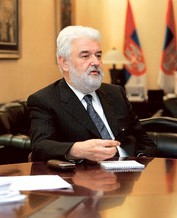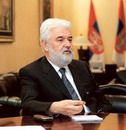Q:
A:
IMF deal best proof of government’s good, sustainable policy
Belgrade,
6 November 2009
Serbian Prime Minister Mirko Cvetkovic said in an interview for today’s edition of the Politika daily that the arrangement with the IMF is the best confirmation that the government’s policy is both good and sustainable.
The government’s official web site gives excerpts from the interview.
Talks with the IMF:
There is no better confirmation that the government’s policy is good and sustainable, both short and mid-term, than the successfully concluded talks with the IMF. This is not just a certificate, but also proof that the IMF is sure that Serbia deserves to be granted the €3 billion loan. This means we are a credible partner and that we will be able to repay the loan.
The National Bank of Serbia will decide when and how much money we will draw, because the loan is not intended for the budget but for foreign currency reserves, which are already quite solid and stand at €9.7 billion.
Were the talks unpredictable until the very last moment?
I do not think they were that vacillating or difficult. The main stumbling block was the definition of sustainable economic and fiscal policy for a medium and long term period. For instance, we had to make sure the economy would not collapse through having to repay too many loans. Sustainable policy implies a zero deficit in a mid-term period that can be financed from our own resources.
When could the deficit be brought down to zero?
The idea is to achieve that in three to four years, to bring the deficit from 4.5% to 4% next year and to 3% in 2011 and so on. This is fully sustainable.
We should keep in mind that in times of crisis the deficit is the cure for recession and it is justifiable even if the state’s debt increases. Our debt this year increased by only €200–300 million. We will now reduce the deficit and restructure budget expenses by cutting current spending for the sake of capital spending in such a way as to keep the capital portion of the budget larger than the deficit.
Reducing costs for pensions and pension system reform:
Pensions and salaries will remain frozen in 2010, but in 2011 we will begin indexing them in line with the bill that will be prepared before the next arrival of the IMF mission in February. This will not only be a formula for synchronising salaries and pensions, but it will also help to improve the control of and criteria for retirement.
How will pensions be synchronised?
They will be in line with the economy. We have several options and I believe we will find one that is acceptable to both the state and pensioners.
What is to be done in the upcoming period so that the IMF Board affirms revision in end-December?
We must adopt the budget and accompanying laws to ensure that our revenues are at the agreed level. The parliament must adopt the laws that are the basis for the rationalisation of the administration at state and local levels. We agreed with the IMF about ballpark figures and we now have to squeeze the individual budget provisions into them.
How will citizens and the economy benefit from the announced corrections in tax regulations?
Since we decided not to reduce the deficit by increasing revenues but by reducing expenses, tax corrections will not be an additional burden for our tax payers. We will strive to introduce more fairness, to simplify the system and ensure better tax collection.
Budget savings:
Three major budget elements are pensions and salaries that will remain frozen and social contributions which will be increased in certain fields. By keeping salaries and pensions frozen we saved over RSD 50 billion. Additional savings will be made through layoffs in administration and by freezing the determined amount for the procurement of goods and services.
Is the government counting on the $200 million Russian loan, along with the funds from the EU, World Bank and loans in the domestic market, for covering the deficit?
Yes, if we are offered conditions that are acceptable to us.
What is acceptable for Serbia?
Something between very favourable conditions for loans from international financers, like the World Bank, and the conditions under which we are granted loans for covering the deficit with commercial banks.
What if that is not acceptable for the Russian side?
We do not have to do anything. Thanks to the financial policy we have been conducting this year, we now do not have to act hastily and take loans.
About state subsidies:
Subsidies are, unfortunately, a necessity but I want to start a debate about this issue and determine the priorities and then the criteria for granting subsidies. Anyways, as has already been agreed, subsidies for next year cannot exceed RSD 43 billion.
Talks with the IMF:
There is no better confirmation that the government’s policy is good and sustainable, both short and mid-term, than the successfully concluded talks with the IMF. This is not just a certificate, but also proof that the IMF is sure that Serbia deserves to be granted the €3 billion loan. This means we are a credible partner and that we will be able to repay the loan.
The National Bank of Serbia will decide when and how much money we will draw, because the loan is not intended for the budget but for foreign currency reserves, which are already quite solid and stand at €9.7 billion.
Were the talks unpredictable until the very last moment?
I do not think they were that vacillating or difficult. The main stumbling block was the definition of sustainable economic and fiscal policy for a medium and long term period. For instance, we had to make sure the economy would not collapse through having to repay too many loans. Sustainable policy implies a zero deficit in a mid-term period that can be financed from our own resources.
When could the deficit be brought down to zero?
The idea is to achieve that in three to four years, to bring the deficit from 4.5% to 4% next year and to 3% in 2011 and so on. This is fully sustainable.
We should keep in mind that in times of crisis the deficit is the cure for recession and it is justifiable even if the state’s debt increases. Our debt this year increased by only €200–300 million. We will now reduce the deficit and restructure budget expenses by cutting current spending for the sake of capital spending in such a way as to keep the capital portion of the budget larger than the deficit.
Reducing costs for pensions and pension system reform:
Pensions and salaries will remain frozen in 2010, but in 2011 we will begin indexing them in line with the bill that will be prepared before the next arrival of the IMF mission in February. This will not only be a formula for synchronising salaries and pensions, but it will also help to improve the control of and criteria for retirement.
How will pensions be synchronised?
They will be in line with the economy. We have several options and I believe we will find one that is acceptable to both the state and pensioners.
What is to be done in the upcoming period so that the IMF Board affirms revision in end-December?
We must adopt the budget and accompanying laws to ensure that our revenues are at the agreed level. The parliament must adopt the laws that are the basis for the rationalisation of the administration at state and local levels. We agreed with the IMF about ballpark figures and we now have to squeeze the individual budget provisions into them.
How will citizens and the economy benefit from the announced corrections in tax regulations?
Since we decided not to reduce the deficit by increasing revenues but by reducing expenses, tax corrections will not be an additional burden for our tax payers. We will strive to introduce more fairness, to simplify the system and ensure better tax collection.
Budget savings:
Three major budget elements are pensions and salaries that will remain frozen and social contributions which will be increased in certain fields. By keeping salaries and pensions frozen we saved over RSD 50 billion. Additional savings will be made through layoffs in administration and by freezing the determined amount for the procurement of goods and services.
Is the government counting on the $200 million Russian loan, along with the funds from the EU, World Bank and loans in the domestic market, for covering the deficit?
Yes, if we are offered conditions that are acceptable to us.
What is acceptable for Serbia?
Something between very favourable conditions for loans from international financers, like the World Bank, and the conditions under which we are granted loans for covering the deficit with commercial banks.
What if that is not acceptable for the Russian side?
We do not have to do anything. Thanks to the financial policy we have been conducting this year, we now do not have to act hastily and take loans.
About state subsidies:
Subsidies are, unfortunately, a necessity but I want to start a debate about this issue and determine the priorities and then the criteria for granting subsidies. Anyways, as has already been agreed, subsidies for next year cannot exceed RSD 43 billion.











